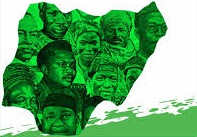Nigeria has a rich and diverse history, with various ancient kingdoms, empires, and city-states flourishing across its regions before European colonization. Here’s an overview of Nigeria’s pre-colonial history, divided by major regions:

1. Northern Nigeria (Hausa Kingdoms, Kanem-Bornu, and Others)
-
Hausa Kingdoms (7th–19th century):
The Hausa people established seven major city-states (Hausa Bakwai): Daura, Kano, Katsina, Zaria, Gobir, Rano, and Biram. These states were centers of trade, Islamic scholarship, and governance.-
Kano became a major commercial hub under Sarki Muhammad Rumfa (15th century).
-
Zaria (Zazzau) was ruled by Queen Amina in the 16th century, known for her military conquests.
-
-
Kanem-Bornu Empire (9th–19th century):
-
Originated around Lake Chad, the Kanem Empire later shifted to Bornu.
-
Under Mai Idris Alooma (16th century), it became a powerful Islamic state with strong military and trade networks (trans-Saharan trade).
-
-
Sokoto Caliphate (1804–1903):
-
Founded by Usman dan Fodio after a jihad against Hausa rulers.
-
Became one of Africa’s largest pre-colonial states, governed by Islamic law.
-
2. Southwestern Nigeria (Yoruba Kingdoms)
-
Ife Kingdom (11th–15th century):
-
Regarded as the spiritual homeland of the Yoruba people.
-
Famous for its terracotta and bronze sculptures (Ife art).
-
-
Oyo Empire (14th–19th century):
-
One of the most powerful Yoruba states, known for its cavalry and political system (Alaafin as king).
-
Controlled trade routes to the coast and engaged in the slave trade.
-
Declined due to internal strife and Fulani invasions.
-
-
Benin Kingdom (11th–19th century):
-
Although Edo-speaking, Benin had strong ties with Yoruba states.
-
Famous for its bronze plaques, ivory carvings, and walled city.
-
Ruled by the Oba (king), with significant influence over trade with Europeans.
-
3. Southeastern Nigeria (Igbo and Other Societies)
-
Nri Kingdom (10th–20th century):
-
A spiritual and political center for the Igbo people.
-
The Eze Nri was a religious leader who spread cultural practices like the Iguaro (yam title) system.
-
-
Aro Confederacy (17th–19th century):
-
Dominated the slave trade through the Arochukwu oracle (Long Juju).
-
Controlled trade routes between the coast and hinterlands.
-
-
City-States (Onitsha, Aboh, etc.):
-
Independent communities with republican systems (no centralized kingship).
-
Trade with Europeans (especially palm oil in the 19th century).
-
4. Niger Delta & Coastal Regions (City-States and Trade Hubs)
-
Kalabari, Bonny, and Opobo:
-
Controlled trade with Europeans (slaves, later palm oil).
-
Ruled by wealthy merchant kings like Jaja of Opobo.
-
-
Efik Kingdom (Calabar):
-
Major center for the slave trade and later missionary activities.
-
5. Middle Belt (Diverse Ethnic Groups)
-
Jukun, Nupe, and Tiv:
-
The Jukun (Kwararafa) had a powerful kingdom that rivaled Hausaland.
-
The Nupe Kingdom was influenced by Islamic culture and engaged in wars with Oyo.
-
European Contact & Decline of Kingdoms (15th–19th Century)
-
Portuguese (1472): First Europeans to reach Nigeria (Benin, Warri).
-
Slave Trade (16th–19th century): Coastal kingdoms grew wealthy but suffered from warfare.
-
British Colonization (19th century): The fall of the Sokoto Caliphate and Benin in 1897 marked the end of most independent kingdoms.
Conclusion
Nigeria’s pre-colonial history was shaped by powerful empires, trade networks (trans-Saharan and Atlantic), and diverse political systems (monarchies, city-states, and republics). The British later merged these distinct regions into one colony in 1914, forming modern Nigeria.
Leave a Reply